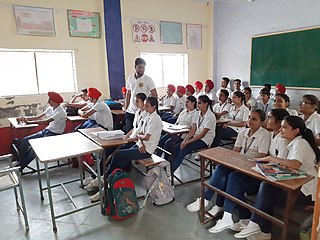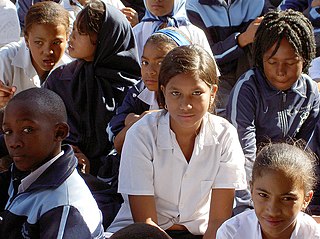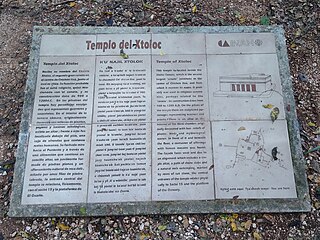
Education in India is primarily managed by the state-run public education system, which falls under the command of the government at three levels: central, state and local. Under various articles of the Indian Constitution and the Right of Children to Free and Compulsory Education Act, 2009, free and compulsory education is provided as a fundamental right to children aged 6 to 14. The approximate ratio of the total number of public schools to private schools in India is 10:3.
Language policy is both an interdisciplinary academic field and implementation of ideas about language use. Some scholars such as Joshua Fishman and Ofelia García consider it as part of sociolinguistics. On the other hand, other scholars such as Bernard Spolsky, Robert B. Kaplan and Joseph Lo Bianco argue that language policy is a branch of applied linguistics.

Russification, Russianisation or Russianization, is a form of cultural assimilation in which non-Russians adopt Russian culture and Russian language either voluntarily or as a result of a deliberate state policy.

The Flemish Parliament constitutes the legislative power in Flanders for matters which fall within the competence of Flanders, both as a geographic region and as a cultural community of Belgium.

The Ministry of Education, Culture, Sports, Science and Technology, also known as MEXT, is one of the eleven ministries of Japan that compose part of the executive branch of the government of Japan.

The University of Tsukuba is a national research university located in Tsukuba, Ibaraki, Japan.

South African Sign Language is the primary sign language used by deaf people in South Africa. The South African government added a National Language Unit for South African Sign Language in 2001. SASL is not the only manual language used in South Africa, but it is the language that is being promoted as the language to be used by the Deaf in South Africa, although Deaf peoples in South Africa historically do not form a single group.

Education in South Africa is governed by two national departments, namely the Department of Basic Education (DBE), which is responsible for primary and secondary schools, and the Department of Higher Education and Training (DHET), which is responsible for tertiary education and vocational training. Prior to 2009, both departments were represented in a single Department of Education. Among sub-Saharan African countries, South Africa has one of the highest literacy rates. According to The World Factbook - Central Intelligence Agency as of 2019, 95% of the population aged from 15 and over can read and write in South Africa were respectively literate.

The Constitution of Mexico does not declare an official language; however, Spanish is the de facto national language spoken by over 99% of the population making it the largest Spanish speaking country in the world. Due to the cultural influence of the United States, American English is widely understood, especially in border states and tourist regions, with a hybridization of Spanglish spoken. The government also recognizes 63 indigenous languages spoken in their communities out of respect, including Nahuatl, Mayan, Mixtec, etc.

National Council of Educational Research and Training (NCERT) is an autonomous organisation of Ministry of Education, the Government of India. Established in 1961, it is a literary, scientific and charitable Society under the Societies Registration Act. Its headquarters are located at Sri Aurbindo Marg in New Delhi. Dr. Dinesh Prasad Saklani is the director of NCERT since 2022.
Department of Higher Education is the department under Ministry of Education, that oversees higher education in India.
The National Policy on Education (NPE) is a policy formulated by the Government of India to promote and regulate education in India. The policy covers elementary education to higher education in both rural and urban India. The first NPE was promulgated by the Government of India by Prime Minister Indira Gandhi in 1968, the second by Prime Minister Rajiv Gandhi in 1986, the third by Prime Minister P.V. Narasimha Rao in 1992, and the fourth by Prime Minister Narendra Modi in 2020.
Education in Tibet is the public responsibility of the Ministry of Education of the People's Republic of China. Education of ethnic Tibetans is partly subsidized by the government. Primary and secondary education is compulsory, while preferential policies aimed at Tibetans seek to enroll more students in vocational or higher education.

The Netherlands Space Office (NSO) is the space agency of the Netherlands.

The Ministry of Education (MoE) is a ministry of the Government of India, responsible for the implementation of the National Policy on Education. The ministry is further divided into two departments: the Department of School Education and Literacy, which deals with primary, secondary and higher secondary education, adult education and literacy, and the Department of Higher Education, which deals with university level education, technical education, scholarships, etc.
Information technology (IT) in Pakistan is a thriving industry with significant potential for growth. The Ministry of Information Technology oversees its development. Despite financial crises, the IT sector has consistently demonstrated economic success.
Open access in New Zealand consists of policies and norms affecting making research outputs, data, and education materials openly available. This is influenced by tertiary education institutions as well as national government and changing international norms. The New Zealand Government has applied open access principles to its own work, adopting the New Zealand Government Open Access Licensing Framework (NZGOAL). It has not mandated that these apply to schools or the tertiary sector or to research funding agencies. Some tertiary education institutions have developed their own open access guidelines or policies but neither of the two major research funding agencies in New Zealand—the Marsden Fund and the Health Research Council—have done so, unlike Australia, Canada, Europe or the United States.

Lucija Čok is a Slovene linguist, senior researcher in the field of multilingualism and a professor of multilingualism and intercultural communication. Throughout her career, she has held several important positions, including that of the Minister of Education, Science and Sport (2000–2002) of the Government of the Republic of Slovenia. In her role as the Minister, she contributed to the establishment of higher education institutions in the Slovene region of Primorska and in 2003 she was elected as the first rector of the newly established university. She participated in European Commission high expert panels that have shaped linguistic policies and strategies of higher education and research. She has facilitated the preparation of the formal basis for Slovenia’s integration into the European Research Area. She was an expert of the Institutional evaluation program board and member of the Council of the Slovenian Quality Assurance Agency for Higher Education. Her research work and publications focus on the formation of models of bilingual education in areas of linguistic and cultural contact, sociolinguistic and didactics of intercultural communication. In 2013, the University of Primorska named her professor emeritus. The same year, she received a lifetime achievement award for her work in the field of Higher Education by the Ministry of Education, Science and Sport.
The National Education Policy of India 2020, which was started by the Union Cabinet of India on 29 July 2020, outlines the vision of new education system of India. The new policy replaces the previous National Policy on Education, 1986.
The federal government of the United States has limited authority to act on education, and education policy serves to support the education systems of state and local governments through funding and regulation of elementary, secondary, and post-secondary education. The Department of Education serves as the primary government organization responsible for enacting federal education policy in the United States.











